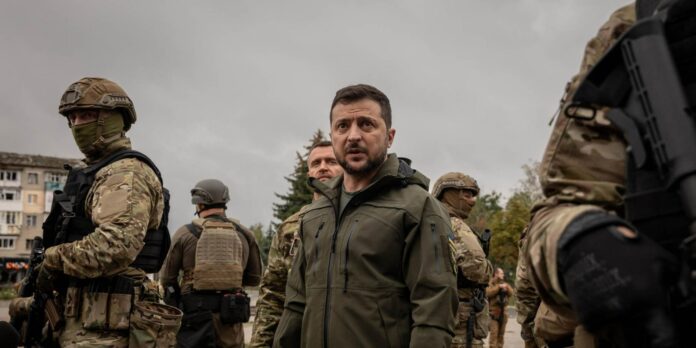Frontpage Journal | Global Report
When Ukraine’s President Volodymyr Zelenskyy appeals for “Article 5–type” security guarantees, he is not merely invoking NATO’s founding treaty but pointing to the very essence of deterrence that has preserved Western Europe’s peace for seventy-five years. NATO’s Article 5, the collective defense clause, binds member states to treat an attack on one as an attack on all. It is the strongest insurance policy in geopolitics. For Ukraine, fighting a grinding war against a larger nuclear-armed neighbor, such a commitment represents survival. The pressing question is whether such a shield can exist without Ukraine’s full NATO membership.
The issue strikes at the heart of Europe’s strategic dilemma. NATO has, since 2008, affirmed that Ukraine “will become a member,” but has avoided giving a timeline. The hesitation stems from a hard truth: extending Article 5 protection to Ukraine today would mean NATO members pledging to directly confront Russia if Moscow escalates. For many in Europe and across the Atlantic, this risk appears too great. Yet for Kyiv, the absence of such a guarantee leaves it in a grey zone, promised integration, but without the deterrence muscle that comes with actual membership.
This gap has led to creative proposals for interim security arrangements. The idea of “Article 5–type” commitments outside NATO has gained momentum in Western capitals. In practice, this could mean bilateral defense treaties with key powers such as the United States, the United Kingdom, France, and Germany. Washington, for instance, has already signed a ten-year security agreement with Ukraine, committing to long-term military aid, training, and intelligence sharing. Britain and several European states have followed with their own pledges. These frameworks fall short of NATO’s automatic defense clause, but they attempt to institutionalize support so that future governments cannot easily reverse course.
Still, the limits are clear. These guarantees, unlike NATO’s Article 5, do not carry the weight of binding mutual defense obligations. They are political commitments, not treaty law backed by alliance consensus. Critics argue that Russia, well aware of the difference, will not treat them as true deterrence. Moscow may calculate that Western aid will continue, but that no NATO soldiers will directly enter the battlefield. In essence, such guarantees reinforce Ukraine’s capacity to resist but do not fundamentally alter Russia’s calculus of escalation.
The history of security pacts outside NATO provides sobering lessons. The 1994 Budapest Memorandum, under which Ukraine gave up its nuclear arsenal in exchange for assurances from the U.S., U.K., and Russia, is the most glaring example. Those guarantees evaporated when Russian forces annexed Crimea in 2014, with the West responding only through sanctions and limited aid. Ukrainians are acutely aware of that betrayal, which is why today they demand guarantees with teeth. Political promises, they argue, are not enough when faced with Russian tanks and missiles.
One potential model under discussion is a coalition-based defense pact, where a “core group” of Western countries would commit to immediate military assistance if Ukraine is attacked again, short of NATO membership. This could resemble the U.S.-South Korea Mutual Defense Treaty or the U.S.-Japan arrangement, where bilateral obligations act as powerful deterrents even outside NATO. Yet even these arrangements depend heavily on the political will of the guarantor. Would the United States, under a future administration skeptical of foreign commitments, really risk direct escalation with Moscow? That uncertainty underscores the fragility of any arrangement that is not NATO’s collective shield.
There is also the matter of credibility. NATO’s Article 5 has never been invoked except once, after the 9/11 attacks, when allies rallied behind the United States. Its deterrence value lies in the perception that the world’s most powerful alliance will not hesitate to act. For Ukraine, any substitute must match that credibility, or risk being dismissed as symbolic. Military analysts argue that unless guarantees include forward-deployed Western troops, integrated air defense, and pre-positioned equipment, they will not be credible enough to deter Russia from future aggression.
Yet, while NATO hesitates, Ukraine is not standing still. Its military is becoming more integrated with NATO standards, its officers trained alongside Western counterparts, and its defense industry increasingly tied to European supply chains. The logic, according to Kyiv, is that the closer Ukraine is to NATO in practice, the harder it becomes for the alliance to deny formal protection indefinitely. In this sense, interim guarantees are a bridge, a way to keep Ukraine inside the Western security architecture until politics align for membership.
The political calculations extend beyond deterrence. For Europe, providing Ukraine with security assurances without NATO membership avoids immediate confrontation with Moscow while still signaling long-term commitment. For Washington, it allows support without crossing the threshold into direct war. For Kyiv, it is a lifeline to survival and a step toward eventual full integration. The challenge is balancing these interests in a way that does not leave Ukraine trapped in permanent limbo, always promised protection but never truly secured.
Ultimately, the debate reveals the evolving nature of security in the 21st century. The rigid frameworks of the Cold War, alliances bound by treaties, are giving way to flexible, layered guarantees, where political will and material support matter as much as formal obligations. Ukraine’s fight has accelerated this shift, forcing Western capitals to reconsider how deterrence works against a nuclear-armed adversary that rejects international norms.
For Ukraine, the demand remains clear: words must be backed by enforceable action. An Article 5–type guarantee without NATO membership may buy time and reinforce the battlefield effort, but unless it carries credible military deterrence, it risks becoming yet another paper promise. What Kyiv seeks, and what the West must decide, is whether Ukraine belongs permanently inside the European security family or whether it will remain on the margins, defended in words but vulnerable in reality. The outcome will shape not only Ukraine’s survival but the credibility of the Western order itself.




